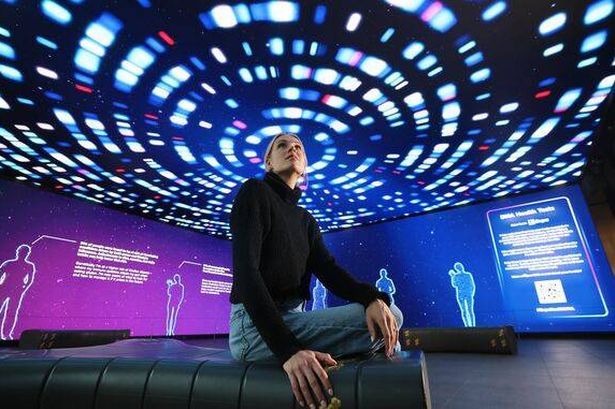
A new installation has been unveiled at The Outernet’s Now Trending building in London, designed to show the impact of DNA and genomes on our health
A mesmerising installation has been unveiled at The Outernet’s Now Trending building in London, designed to showcase how DNA and genomes influence our wellbeing. This captivating display cycles through 3.2 billion characters – symbolising our genetic blueprint.
The project follows research showing that 67 per cent of Britons don’t know what a genome is, with many also lacking basic knowledge about their own body and wellness, including their weight or height. Fewer than half know their typical blood pressure measurement and couldn’t identify their blood group, reports the Express.
Nearly half of Brits have never discussed with their family members about conditions they could be at higher risk of, or even their history of illnesses and according to the survey 26 per cent of Brits have been avoiding routine health screenings.
The most common reason for neglecting their health is either because they worry what they might discover or they find it too overwhelming to think about.
Alarmingly, 35 per cent of those who confessed to ignoring their health admitted that this had resulted in conditions going unnoticed or undiagnosed for longer than necessary.
Bupa wants Brits to take their health seriously(Image: Pinpep)
The visual exhibition and study were commissioned by Bupa to support the launch of its Medication Check – the newest element in its expanding portfolio of DNA Health Tests.
The examination reveals how our unique DNA influences our reaction to various medicines, seeking to cut down on trial and error when doctors prescribe treatments, reduce adverse effects and help patients heal more rapidly.
Carlos Jaureguizar, CEO for Bupa Global, India & UK, said: “Our genetic makeup influences everything from disease risk to how we respond to medication, and it’s key to helping us live well for longer, but it’s hard to grasp how important it is when we can’t see it.
“Our installation makes the invisible visible. Our DNA is as unique as we are, which is why we need a personalised approach to our health. This is the future of healthcare.
“We want to empower people with the information to make healthy choices and seek help early, rather than burying their heads in the sand.”
This installation follows a pilot scheme by Bupa, which saw 2,200 adults undergo whole genome sequencing to analyse how their individual DNA responds to common medicines.
The images scroll through 3.2 billion characters – showing our genetic make up(Image: Pinpep)
A staggering 99 per cent exhibited a genetic variant that impacts their sensitivity to certain medicines, implying that some over-the-counter painkillers, antibiotics and other prescription medications would either be less effective or not work at all.
The pilot also scrutinised the genetic risk of developing 36 preventable diseases, including cancers, heart conditions and type 2 diabetes.
It found that a whopping 91 per cent of participants were at risk of developing a disease with genetic and lifestyle risk factors, such as fatty liver disease, breast cancer and certain heart diseases.
In addition, 73 per cent had multiple genetic variants that put them at an increased risk of developing a condition that could be prevented or detected early, leading to better health outcomes, including high cholesterol, skin cancer and type 2 diabetes.
Furthermore, 49 per cent were identified as carriers of a genetic variant that could lead to an increased risk of certain conditions in future generations.
Dr Rebecca Rohrer, clinical innovation and genomics director for Bupa, said: “While it can seem like ill-health might be an unavoidable part of life, this is often not the case.
“Learning more about our DNA is key to early detection and even preventing some illnesses altogether.
Our future health can seem like something we don’t need to think about now – but understanding how our body responds to medicine, as well as any family history of cancer, diabetes and other genetic diseases can help us take early action.”





